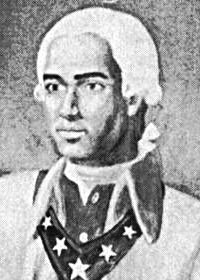
Origin of Prince Hall Masonry
Prince Hall 1738 – 1807
Champion of American Liberty
Advocate of Negro Freedom
Founder of Black Masonry
Throughout history, the powers of single black men flash here and there like falling stars, die sometimes before the world has richly gauged their brightness. W.E.B. DuBois
By Doctor Charles Harris Wesley, Ph.D.
Renowned Scholar, Lecturer, Educator, Author, and Historian
Prince Hall, our Founder, was one of our great Americans; a Worthy Grand Master associated with our first Grand Lodge and its expansion. His name is carried and borne by our Masonic organizations in the United States, and thousands of Masons, who regard themselves as descendants from the Grand Lodge of England from which received his authority more than two centuries ago. We in America celebrated in 1976 the two hundredth anniversary of our Declaration of Independence. This is also the two hundred and, first (201st) anniversary of the founding of Prince Hall Masonry. It is a monument to Prince Hall’s life, career and leadership.
Many rumors of the birth of Prince Hall have arisen. Few records and papers have been found of him either in Barbados where it was rumored that he was born, but no record of birth, by church or state, has been found there, and none in Boston. All 11 of the counties were searched and churches with baptismal records were examined without a find of the name of Prince Hall. The first record that we have of Prince Hall is a manumission paper filed by William Hall of Boston, and found in the Boston Athenaeum. This document tells us.
“Prince Hall has lived with us 21 years and served us well upon all occasions, for which reasons we maturely give him his freedom and that he is no longer to be reckoned a slave, but has been always accounted as a freeman by us, as he has served us faithfully. Upon that account, we have given him his freedom. As witness our hands this ninth day of April, 1770.
Witnesses:
| Susannah Hall | Elizabeth Hall |
| William Hall | Margaret Hall |
Boston 12 April 1770 recorded Boston Athenaeum.
In appearance, our Prince Hall was unlike the portrait, which has been used of him, which was near to a white man in appearance. William Bentley of Salem, Massachusetts, once described him at a Turtle Feast in Salem, Massachusetts as, “An African and a person of great influence among his color in great Boston, being Master of the African Lodge and a person to whom they refer with confidence their principal affairs.” Another, William F. Haywood in his Minutemen and Mariners described another Turtle Feast, “There was one outstanding expert: Prince Hall, a tall, lean Negro of great dignity. He always did, for whenever a well-to-do person wished the best catering job in eastern Massachusetts he sent word to Prince Hall in Boston, and when the time came he appeared with a dozen of his black men or two dozen if the banquet was a large one.” This author described how “four of Prince Hall’s Africans stepped smartly into the tent bearing on their shoulders the great turtle shell filled with a pie to the delight of the guests.” These descriptions make Prince Hall as an African with an African crew. He seemed to be a black man among black men or he would have pointed out, if otherwise.
A significant event in Masonry on March 6, 1775, Prince Hall and fourteen other men were initiated in Masonry through Warrant No. 459, which is still in our possession. John Batt, who was of the 38th Foot Regiment of the British Army having enlisted in 1759 and learning of the American cause re-enlisted in its Army. The enlistees were Prince Hall, Cyrus Johnston, Bueston Slinger, Prince Rees, John Canton, Peter Freeman, Benjamin Tiler, Duff Ruform Thomas Santerson, Prince Rayden, Cato Speain, Boston Smith, Peter Best, Forten Horward, and Richard Titley. The writer has this record. A Permit was issued for these Masons to meet as African Lodge No.1 and they became the first Black Masons in the United States. Prince Hall enlisted and served as a soldier in the 2nd and 6th Regiments of Massachusetts. In this connection, George W. Williams, historian, wrote in 1884, “that he saw hard service we know by the record of the two regiments he served in, always distinguished for steadiness’ and valor. Prince Hall was not only a good soldier, he was a statesman.”
